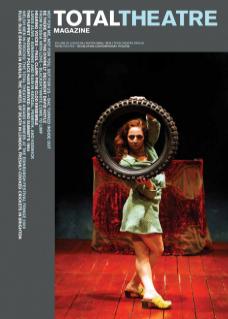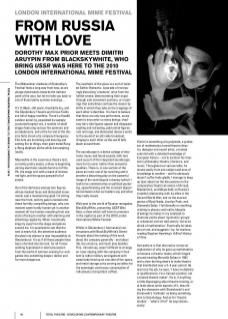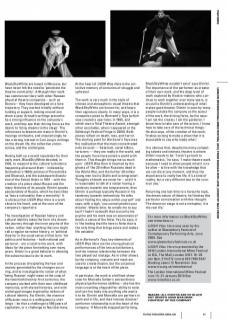The Midsummer madness of Glastonbury Festival feels a long way from now, as we plunge downwards towards the darkest point of the year, but let me take you back to one of those balmy summer evenings…
It’s 11.00pm, still warm, thankfully dry, and the Glastonbury Theatre and Circus Fields are full of happy revellers. There’s a floodlit outdoor aerial rig, populated by spangly-costumed trapeze-ers, a number of small stages featuring various fire-spinners and acrobalancers, and at the far end of the theatre field, street arts company Emergency Exit Arts are drumming and dancing and setting fire to things, their giant metal Runga-Rung elephant all the while harrumphing loudly.
Meanwhile in the cavernous theatre tent, currently pretty empty, a show is beginning. Jarring electronic sounds burst out of the PA, the stage is lit with a wash of intense red light, and the space pumped full of smoke.
Out of the darkness emerge two figures, whose masked faces and dislocated movements cast a mesmerising spell. I’m sitting near the front, and my gaze is locked onto these horribly compelling beings, who one moment seem hardly human yet in another moment all-too-human; morphing from one state of being to another with alarming and disturbing regularity. When I eventually drag my eyes from the stage and glance around me, I’m surprised to see that the tent is nearly full, the attentive audience shocked into silence (a near impossibility at Glastonbury). It’s as if all these people have been charmed into the tent, for all I know walking hypnotised in silent procession from the world of summer evening fun-and-games into something deeper, darker and far more dangerous.
The aesthetic of the piece is a sort of twisted Gothic-Romantic. A parade of increasingly disturbing ‘creatures’ arise from the hellish smoke, demonstrating their angst through solo movement sections, or in pairings that sometimes confuse the viewer by shifts in which they take on the trappings of each other’s identities. It is hard to believe that there are only two performers, as we seem to encounter so many beings: shadowy fairy-tale figures appear and disappear, cajoling and retreating; patriarchal figures rant and rage; and dislocated dancers waltz to the sound of an old radio broadcast, clinging to each other as the world falls down around them.
The soundscape is a dense collage of electronic music and found sounds, with text used as part of the integrated soundscape more for its sonic (rather than semantic) qualities. There is, in one section of the piece an ironic use of lip-synching and in another a disturbing play on the powerful image of the ventriloquist’s dummy (which I took to be commentaries on political posturing, speech-making and the constant disparities between what our leaders say and what they really mean).
Welcome to the world of Russian renegades BlackSkyWhite, presenting USSR Was Here, a show which will have its premiere in the capital as part of the 2010 London International Mime Festival.
Whilst in Glastonbury I had several conversations with BlackSkyWhite’s Dimitri Aruypin about the making of this work, about the company generally – and about life, the universe, and much else besides. This, I should say, wasn’t difficult to arrange as I was staying with the company in their tent (a rather military arrangement with camp beds lined up on one side of the space, and metal storage units serving as tables for the seemingly continuous consumption of ridiculously strong black coffee).
Dimitri is something of a polymath, a professor of mathematics turned theatre director, designer and sound artist; a trained scientist with a detailed knowledge of European history – not to mention his interest in philosophy, theatre, literature, and music. Throughout our various talks, he moves easily from one subject and area of knowledge to another – and he obviously doesn’t suffer fools gladly. I manage to keep up (just about) on the discussions on the comparative theatrical visions of Artaud, Maeterlinck, and Meyerhold; on Russia’s troubled relationship with its allies in the Second World War; and on the musical genius of Ryoji Ikeda, Jocelyn Pook, and Diamanda Galas. I fail dismally on anything relating to physics and maths (despite drawings he makes in my notebook to illustrate points about ‘symmetric groups’ or whatever) and am told sternly ‘not to be afraid of mathematics’. Eventually he takes pity on me, and suggests I try, for starters, reading Stephen Hawking’s A Brief History of Time.
Somewhere in that discussion comes an explanation of why he gave up mathematics to become a theatre-maker, which hinged around meeting Marcella Soltan in 1987, and a slow-burning desire to make theatre that manifested over a 3–4 year period. He learnt on the job, he says, ‘I have no diploma or qualifications; I’m a trained scientist, not a trained theatre-maker’. He is, if anything, a little disparaging about theatre training, or at least about some aspects of it, describing the obsession with Stanislavski’s and Grotowski’s ‘methods’ as being something akin to Scientology. And as for ‘theatre studies’ – ‘what’s it for?’ he says dismissively.
BlackSkyWhite are based in Moscow, but have never felt the need to ‘penetrate the theatre community’. Although their work has common territory with other Russian physical theatre companies – such as Derevo – they have developed on a lone trajectory. They worked initially without funding or support, making around one show a year. Artaud’s writings proved to be a strong influence on the company’s work, and they see their driving force as the desire to ‘bring dreams to the stage’. The references to dreams are many in Dimitri’s musings on theatre, and unsurprisingly he has a strong interest in Carl Jung’s writings on the dream life, the collective unconscious, and the archetypes.
Having built up a sound reputation for their early work, BlackSkyWhite decided, in 1993, to respond to the cultural turbulence happening all around them – initiated by Gorbachev’s 1980s policies of Perestroika and Glasnost, and the subsequent dissolution of the Soviet Union in 1991 – with the creation of a piece about Russia and the many histories of its people. Dimitri speaks passionately of Russia, which he describes as ‘less a nationality than a mentality’. It is obvious that USSR Was Here is a work close to his heart, and at the core of the company’s repertoire.
The investigation of Russian history and cultural identity takes the form of a dreamlike journey through the inner psyche of the nation, rather than anything that one might call a regular narrative history, or ‘political theatre’ in the usual sense of that term. Yet politics and histories – both national and personal – are crucial to the work, with ideas for the piece fermenting over many years. Dimitri is a great believer in allowing the subconscious to do its work.
In the process of exploring the fear and anxiety generated by the changes occurring, and to investigate the notion of what ‘being Russian’ might mean at the cusp of the twentieth/twenty-first centuries, the company worked with their own childhood memories, with shared histories, and with archetypal images inspired by notions of cultural identity. For Dimitri, the essence of Russian-ness is a willingness to challenge – be that a challenge to 500 years of capitalism, or a challenge to Nazi Germany. At the heart of USSR Was Here is the collective memory of centuries of struggle and upheaval.
The work is very much in the style of intense and atmospheric visual theatre that BlackSkyWhite are known for, and bears their signature clearly. In many ways, it is a companion piece to Bertrand’s Toys (which was created a year later, in 1995, and which won a Total Theatre Award, amongst other accolades, when it appeared at the Edinburgh Festival Fringe in 2000). Both pieces reflect on death, loss, and horror. The starting point for Bertrand’s Toys was ‘the realisation that the most concentrated evils do exist — Satanism, serial killers, torturers — they are really in the world, and the people I love have joined a world with them in. This thought brings me so much pain.’ USSR Was Here is haunted by the ghosts of ‘the 20 million Russians dead in the World War, and the further 20 million young men lost to Stalin and to emigration’. Thoughts of death are never far – and if it is reasonable to talk of a nation having a tendency towards one temperament, then Dimitri is perhaps typically Russian in his tendency towards melancholy. He talks about ‘feeling the abyss within yourself’ and says, with a sigh, ‘you cannot predict your dreams’. Weeks later, he emails me to say (as if I hadn’t noticed!) that crucial to his psyche and his work was an awareness of death, a sense of the finite. Yet, he says, it is ‘the feeling that life here is finite that is the only thing that brings sense and makes life valuable’.
As in Bertrand’s Toys, key elements of USSR Was Here are the strong physical performances of the two actor/dancers, and the intense relationship between the two played out onstage. As in other shows by the company, costume and mask are used to create illusion, but the corporeal language is at the heart of the piece.
In particular, the work is a brilliant showcase for Marcella Soltan’s extraordinary physical performance abilities – she has the most unsettling shapeshifter ability to twist and turn her body into anything she wants it to be. Dimitri and Marcella are partners in work and in life, and their intense director/ performer relationship is at the heart of the company. ‘If Marcella stopped performing, BlackSkyWhite wouldn’t exist’ says Dimitri. The importance of the performer as creator of their own work, and the deep level of work explored by theatre-makers who continue to work together over many years, is crucial to Dimitri’s understanding of what makes good theatre. Dimitri is seen by many people outside the company as the auteur of the work, the driving force, but he says: ‘I am not the creator, I am the gardener. I know how to take care of the actors. I know how to take care of the technical things.’ He also says, of the creation of the work: ‘It takes so long to make a show that it is impossible to say who made what.’
It is obvious that, despite his many competing talents and interest, theatre is where Dimitri needs to be: ‘I won’t go back to mathematics,’ he says, ‘I make theatre work because I need to show people what it is to be alive – to live with the knowledge that we can die at any moment, and thus the importance to really live life. It’s a kind of reality, but a very different one to the common one.’
Returning one last time to a favourite topic, the dream nature of theatre, he finishes this particular conversation with this thought: ‘The dream on stage is not a metaphor, it is the real life.’
For more information on BlackSkyWhite see www.bsw.ru
USSR Was Here was seen by the author at Glastonbury Festival of Contemporary Performing Arts, June 2009. See www.glastonburyfestivals.co.uk
USSR Was Here is presented by the 2010 London International Mime Festival at ICA, The Mall, London SW1: 16–20 Jan 8pm. £14 (£12 concs) 020 7930 3647 Booking opens 12 November. See www.ica.org.uk/mimefestival
The London International Mime Festival runs 13–31 January 2010 See www.mimefest.co.uk


